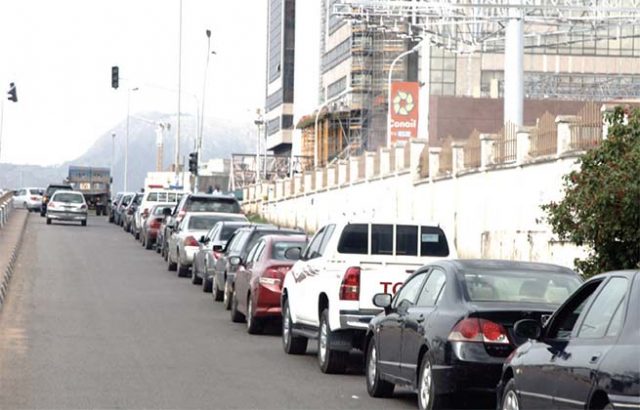A looming fuel scarcity crisis threatens Lagos and other parts of Nigeria as petroleum tanker drivers have suspended fuel loading operations, citing alleged harassment by officials of the Lagos State Government and the Federal Ministry of Transportation.
The halt in operations, which began over the weekend, has raised concerns of an impending fuel shortage, potentially affecting businesses, transport systems, and daily activities. Additionally, telecommunications companies have warned that the ongoing strike could disrupt diesel supply, jeopardizing mobile and internet services across the country.
Drivers Accuse Government Officials of Harassment
According to reports gathered by Hobnob News, petroleum tanker drivers were unable to load fuel on Saturday and Sunday, raising fears of scarcity in major Nigerian states, including Lagos. The National President of the Nigerian Association of Road Transport Owners (NARTO), Yusuf Othman, stated that his members have been subjected to physical assault and intimidation by government task force officials.
Othman alleged that the Lagos State Government’s task force has been towing fuel trucks and issuing heavy fines to drivers, creating an atmosphere of uncertainty and disruption in fuel distribution.
“Our drivers are being beaten, and our trucks are being impounded without just cause,” he said. “The task force has damaged our union’s vehicles, and this has led to a complete halt in fuel loading. There was no loading on Saturday and Sunday, and I cannot confirm if operations will resume on Monday (today).”
When asked if this would lead to fuel scarcity, Othman remarked, “I cannot say for certain, but if loading does not resume soon, fuel supply chains will be heavily affected. The authorities need to engage with us to resolve these issues because refineries and depots cannot function without tanker trucks to transport petroleum products.”
Lagos State Government Denies Allegations
Reacting to the allegations, the Lagos State Government dismissed claims of undue harassment and instead emphasized the necessity of enforcing regulations to prevent road congestion. The Permanent Secretary of the Lagos State Ministry of Transportation, Wale Musa, explained that the government was implementing its e-call-up system to manage traffic flow around major petroleum depots, particularly along the Dangote Refinery corridor.
“We are committed to ensuring compliance with the e-call-up system to regulate truck movements,” Musa stated. “Lagos will not allow the Lekki-Epe axis to become another Apapa, which suffered years of gridlock due to unregulated truck activities. The government will not succumb to blackmail, and we urge the tanker drivers to comply with regulations for the greater good of all road users.”
The Lagos State e-call-up system, introduced in September 2024, was designed to digitally manage the movement of tankers and heavy-duty trucks in order to reduce congestion and improve logistics efficiency. However, the enforcement of the system has led to increased friction between transport operators and regulatory authorities.
Telecom Operators Warn of Network Disruptions
Amidst the ongoing strike, Nigeria’s telecommunications industry has raised alarms over the potential impact on mobile and internet services due to diesel supply disruptions.
The Association of Telecommunications Companies of Nigeria (ATCON), representing major telecom operators, warned that if the strike persists, it could cripple connectivity across the country.
“Telecommunication networks depend on diesel to power their base stations,” said ATCON President, Tony Emoekpere. “While infrastructure providers maintain reserve fuel supplies, many sites are already running critically low. If fuel supply is disrupted for an extended period, widespread service outages may occur.”
Telecom giants such as MTN, Airtel, Globacom, and 9mobile rely on infrastructure companies like IHS Towers, American Tower Company, and Pan African Towers to manage and power their base stations. These firms, which rely heavily on diesel-powered generators, have already reported difficulties in securing diesel amid the tanker drivers’ strike.
“This situation is alarming,” Emoekpere added. “We cannot afford to wait until a complete network shutdown before taking action. Telecom infrastructure is critical national infrastructure, and contingency plans must be activated to ensure connectivity is maintained.”
ATCON has called on the governors of Lagos and Ogun states to facilitate the release of diesel from petroleum depots to telecom operators as a preventive measure. The association also urged security agencies and transport unions to resolve the crisis urgently to avoid economic and communication breakdowns.
Impending Economic and Social Disruptions
If the strike persists, the effects will ripple across multiple sectors, affecting businesses, banking services, emergency response units, and everyday communication. Millions of Nigerians rely on stable telecom networks for both personal and professional purposes, and disruptions could lead to significant financial and operational setbacks.
With no immediate resolution in sight, stakeholders are urging the federal and state governments to engage in urgent dialogue with tanker drivers to prevent a full-blown crisis. As Nigerians brace for potential fuel shortages and communication disruptions, the need for a swift and amicable resolution becomes even more critical.

